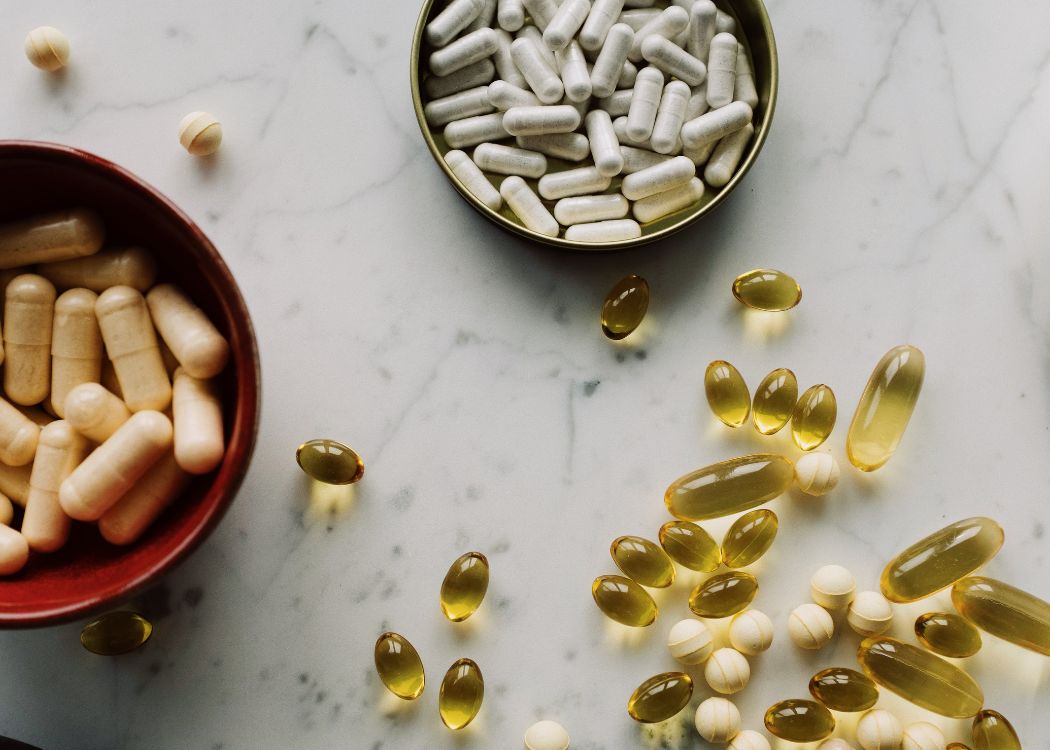A Nutritionist Picks The 9 Best Vitamins For Energy
There are a wide range of vitamins & supplements known for their ability to combat tiredness and boost energy, but which are the best at what they do? When your energy levels are on the floor or you are napping at 4pm it’s time for a boost. Check out these 9 vitamins for more energy.
By Nina Sabat (BSc Hons Dip NT)
What Vitamins Are Good For Energy?
A common way to think of energy is in terms of your physical or mental wellbeing - how lively or alert you feel.
For example, if you must have coffee to get going in the morning or are unfocused and ready for a nap when it’s only 4pm, then your levels of physical or mental energy may be below par.
Another way to approach the idea of energy, is in regard to the cellular processes which transform the latent energy in your food into molecules of ATP that your body can use.
It’s useful to have these 2 themes in mind because when you’re considering vitamins which support your energy levels you can weave these 2 ideas together.
Let’s look at this now.
Vitamins help you feel less tired
Energy and fatigue are purely subjective. How you feel is relative to internal evaluations of your stamina and health.
Do you feel ‘fit’, ‘strong’, ‘switched on’, ‘capable’? Or do you feel ‘weak’, ‘exhausted’, ‘drained’? Consider how quickly this changes when you’ve had a bad night’s sleep, been working late, exercising hard, or skipped a meal.
But lack of energy can become a constant and require additional support.
Taking vitamins which are good for energy, like B complex vitamins, vitamin C and vitamin D can give you a boost. There are many clinical studies that indicate that increasing your intake of specific vitamins combat feelings of physical tiredness and mental fatigue.
Vitamins help your cells produce more energy
Now consider the internal metabolic processes which create the ATP energy which powers your cells.
The metabolic processes which release energy from your diet have 2 requirements.
Firstly, they need some raw material. This is the food on your plate which supplies the macronutrients – carbohydrates, proteins, fat and fibre – to be digested and transformed.
Secondly, they need catalysts. This is where a handful of key vitamins come into play. They’re like a support team, helping to spark the metabolic reactions which transform your food.
As a result, your food choices can significantly impact your energy levels. If your intake of these key vitamins is low, the whole energy-production process can become compromised and slow down.
The best vitamins for energy include the B vitamins, vitamin C and vitamin D. These vitamins allow your metabolic energy-production processes to run efficiently and create more cellular energy.

The Top 9 Vitamins for Energy & Fighting Fatigue
The top 9 vitamins that are good for energy include: vitamin B2, vitamin B3, vitamin B1, vitamin B5, vitamin C, vitamin B7, vitamin B6, vitamin B12 and vitamin D3.
Before we dig in you should be aware that what follows is more of a list than a ranking.
There are 3 distinct steps to how energy is made in the body - beta oxidation, the citric acid cycle, and oxidative phosphorylation. While some vitamins (like vitamin B2 and B1) appear multiple times throughout the energy-producing pathways, others (like vitamin B6 and B12) only appear once.
But this doesn’t mean they’re less important and that’s because all three steps are connected.
As a Nutritional Therapist, I take a holistic view of the body. It’s the same when it comes to generally supporting energy production or increasing your energy levels. It seems more sensible to support the whole system than to try to narrow the focus down to a few reactions or a particular step.
A team of researchers [1] came to a similar conclusion as they looked at the body of clinical research into the vitamins and minerals for energy, fatigue and cognition:
“There is a close interplay between these micronutrients across the successive steps of energy production. All of them should be available simultaneously as the whole system may be slowed down by a lack in a single one of them”.
So, with my nutritionist’s pick of the 9 vitamins which are good for energy, here’s a quick look at each to see what makes them so great at what they do.
Vitamin B2, riboflavin
Riboflavin is a major player having a role in all 3 steps of the energy-production system.
In beta oxidation (step 1), riboflavin is needed to transform fatty acids, sugars and branched chain amino acids into molecules of acetyl coenzyme A.
Could supplementing vitamin B2 prevent muscle fatigue and increase muscle recovery? Perhaps so.
In an interesting study, a test group of ultramarathon runners were given 100mg of vitamin B2 at the beginning of their race and again at 90km. Not only did they have less muscle pain and soreness at the end of their 161km race, but they ran significantly faster in the days following the race compared to runners who were given a placebo. [2]
Vitamin B1, thiamine
Thiamine is required for step 1 and step 2 of the energy-production system.
In the citric acid cycle (step 2) niacin is used in the oxidation reactions, helping to generate energy stored up in molecules of FADH2 and NADH.
Having adequate intakes of vitamin B1 is important for both physical and mental energy.
Vitamin B3, niacin
Niacin is also used in all 3 steps of the energy-production system.
In oxidative phosphorylation (step 3), niacin helps drive the electron transport chain, where electrons from FADH2 and NADH are passed along like hot potatoes, finally generating molecules of ATP energy.
Vitamin B3 intake is good for energy particularly to complete mental tasks.
In a long-term study of 3136 American adults spanning a 20-year period, those with the lowest average daily intake of niacin repeatedly performed significantly worse on cognitive tests compared to those with the highest niacin intake. [3]
Vitamin B5, pantothenic acid
Pantothenic acid is another B vitamin which is used throughout the entire energy-production pathway, first in the breakdown of glucose to produce acetyl coenzyme A, then in the citric acid cycle, and finally in the mitochondrial membrane where billions of ATP molecules are made in each cell.
What makes vitamin B5 good for energy?
Vitamin B5 contributes to mental stamina as it plays an important part in the function of brain cells. It creates the acetyl coenzyme A which is then used to build structural proteins, to activate neurotransmitters and to enable brain cells to communicate.

Vitamin C
Head back to step 1 in energy production pathways and you’ll encounter vitamin C. It’s needed to create carnitine - in fact you may already be familiar with l-carnitine – which is essential for transporting fatty acids into the mitochondria. This means your ability to burn dietary fats and oils to create cellular energy is regulated by vitamin C.
Vitamin C has a second important role in relation to energy production. Vitamin C protects cells from the damaging effects of free radicals and oxidation, which happen whenever metabolic processes occur. [4]
Having low vitamin C levels is noticeable when it comes to feeling physically tired or mentally stressed.
In one study, people with lowest vitamin C intake were more likely to report feeling less healthy and having more physical pain. [5] When supplements of vitamin C were given, participants reported less fatigue in general and less fatigue when they exercised. [6]
Observational studies suggest that having a low vitamin C level is associated with a higher state of anxiety, [7] but when vitamin C intake is increased anxiety is reduced. [8]
If you’re looking for one of the best vitamins for energy which isn’t one of the B vitamins, vitamin C should be on the list, especially if you struggle to eat fresh vegetables and fruit or are prone to feeling anxious.
Vitamin B7, biotin
Biotin-dependent enzymes are found within the mitochondria where biotin helps shuttle acetyl coenzyme A into the citric acid cycle.
Symptoms of vitamin B7 deficiency include lethargy, depression and hallucinations.
Vitamin B6, pyridoxine
Pyridoxine catalyses a single pathway and helps to feed amino acids into the energy-production process. Other roles include creating new glucose molecules and glycogen molecules – a way to store glucose for future use.
Having low vitamin B6 can create both physical and mental fatigue. Microcytic anaemia, where vitamin B6 levels are low, can cause symptoms of tiredness, weakness and fatigue.
Vitamin B12, cobalamin
Although cobalamin is one of the most popular choices of B vitamins for increasing energy, it is only needed in a few of the pathways for producing metabolic energy. Cobalamin helps you create cellular energy from ketogenic amino acids and fatty acids.
Nevertheless, vitamin B12 deficiencies are perceptible and symptoms include shortness of breath, reduced energy, less ability to exercise and increased irritability.
Vitamin B12 will probably remain as one of the go-to-vitamins that are good for an energy boost.
Vitamin D3
Having a vitamin D deficiency or low vitamin D status is linked to symptoms of low energy and muscle fatigue. But without a direct role in the metabolic energy-production pathways, researchers have struggled to explain precisely how vitamin D contributes to energy.
In several other disorders characterised by fatigue, the fault was found to lie in mitochondrial activity. As you know by now, this is where steps 2 and 3 of metabolic energy production occur.
Then in a ground-breaking study a link was found between vitamin D and mitochondrial activity!
Researchers showed that when participants with a severe deficiency supplemented vitamin D, their rate of oxidative phosphorylation increased. This was assessed by measuring how long it took for their mitochondria phosphocreatine levels to reset.
This study showed that as vitamin D status improved, the mitochondria in skeletal muscles recovered faster and produced more ATP energy.
More importantly, when asked to exercise, all individuals in the treatment group reported feeling less muscle weakness and less fatigue. [9]
If you’re looking for one of the best vitamins for energy which isn’t one of the B vitamins, vitamin D should be on the list, especially if you live in a sunshine-deprived climate similar to that of the UK.

Where Can I Buy Vitamins for Energy and Fatigue?
Vitamin B complex
For an energising blast of all the B vitamins try:- New Nordic B-energy Mega Strength
- Viridian Co-Enzyme B Complex
- Biocare Methyl B Complex
- or Shop Revital's full range of Vitamin B Complex
Vitamin C
For a fatigue-fighting hit of vitamin C try:- Altrient C
- Wild Nutrition Food-Grown Vitamin C & Bioflavonoids
- or Shop Revital's full range of Vitamin C
Vitamin D
For a muscle-power boosting dose of vitamin D try:- BetterYou Vitamin D4000 Spray
- Nutri Advanced Vitamin D3 Lemon Melts 2000
- or Shop Revital's full range of Vitamin D
Multivitamin for energy
For an all-in-one formulation for a noticeable burst of energy try:- Pure Encapsulations O.N.E Multivitamin with Iron
- Revive Active Zest Active
- Link Nutrition Energy + CoQ10
References
[1] Tardy, A et al (2020) Vitamins and minerals for energy, fatigue and cognition: a narrative review of the biochemical and clinical evidence
[2] Hoffman, M et al (2017) A placebo-controlled trial of riboflavin for enhancement of ultramarathon recovery
[3] Kim, J and Kang, S (2017) Relationships between dietary intake and cognitive function in healthy Korean children and adolescents.
[4] Johnston, C (2012) Vitamin C.
[5] McCall, S et al (2019) Plasma vitamin C levels: risk factors for deficiency and association with self-reported functional health in the European Prospective Investigation into Cancer - Norfolk
[6] Huck, C et al (2013) Vitamin C status and perception of effort during exercise in obese adults adhering to a calorie-reduced diet.
[7] Gariballa, S (2014) Poor vitamin C status is associated with increased depression symptoms following acute illness in older people
[8] Gautam, M et al (2002) Role of antioxidants in generalized anxiety disorder and depression.
[9] Sinha, A et al (2013) improving the vitamin D status of vitamin D deficient adults is associated with improved mitochondrial oxidative function in skeletal muscle
About Nina Sabat
Nina Sabat is a BANT-registered Nutritional Therapist who applies the principles of Functional Medicine in her practice. Living and working in London she provides supplement and lifestyle advice both instore and online for Revital. Nina received her Nutritional Therapy diploma from The Institute for Optimum Nutrition. She also uses her skills gained from studying Life Coaching and Neuroscience, at University College London, to help her clients create meaningful changes to their health.